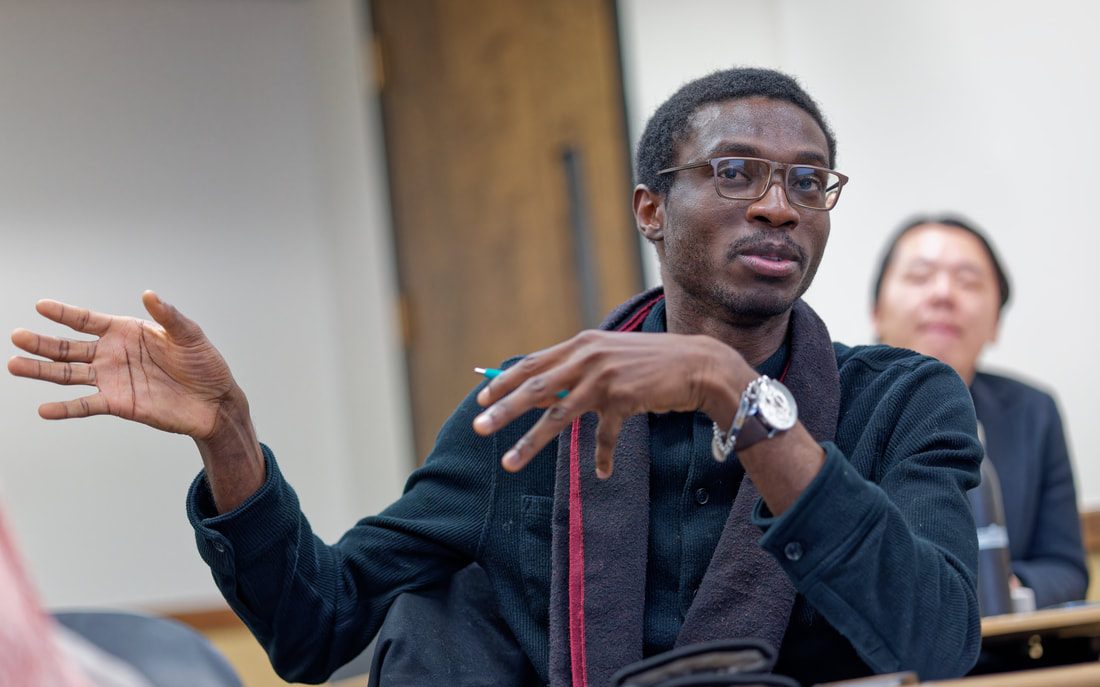“We have good reasons to rationally deliberate on people’s utterances even though we are repulsed by it. This can help us make sense of other people’s worldviews. In fact, this is how we make progress and how we can achieve better collective moral governance” – Idowu Odeyemi.
By Olúwábùkúnmi Awóṣùsì
Idowu Odeyemi loves red wine, and that is exactly what he was sipping when he suddenly became conscious of a question that has always bothered him, and he has always wanted to work on since the age of seven. The question is this: Why do many people feel disgusted because of something someone said? No one has ever asked this question, and with our world becoming more and more polarised, a more important question cannot be asked. In his new philosophical work, Idowu answers this important question. In this conversation, he spoke to me about his new philosophical work.
In August 2022, at the Lagos airport, the immigration officer who checked his passport asked him, “Are you crazy?” Then, with a bit of mild irritation, the immigration officer says, “You’re going to the United States for your PhD in philosophy and you’re just 22 years old. You’re very young! How did your mother allow this?” Indeed, there is a fire in the young boy’s head, but it has nothing to do with craziness.
The fire in Idowu Odeyemi’s head is his cerebral power: he is a young philosophical genius. After winning more than ten research fellowships and grants in both the United States and the United Kingdom and traveling to Oxford on a fully funded research trip, Odeyemi, now 25 years old, has finally let out the fire in his head.

Odeyemi, who finished his undergraduate studies at the age of 19 at Ekiti State University, has proposed a new theory that can help us make sense of our everyday lives: he calls it ‘Epistemic Disgust’. Simply put, Idowu Odeyemi thinks what you say can be disgusting.
Idowu Odeyemi began writing Epistemic Disgust after he couldn’t turn away from how rampant the phenomenon is, especially online. The essay was classic Idowunian—gentle but goes hard on making sense of a complex issue. He wrote the essay over eight months in Boulder and his residence in Ado-Ekiti; he’d wake up at 4 am, listen to Nina Simeone, Fela, and Lauryn Hill till dawn, then go on a 1-hour morning walk before writing all day. “I live quite a solitary life”, he says.
Published in Episteme, a top 10 philosophy journal according to rankings of philosophy journals, Odeyemi’s new theory of disgust conceptualises and demystifies what he thinks is a neglected phenomenon in both humanistic and scientific scholarship—which is the fact that a hearer can be disgusted by the utterances of a speaker, or a reader can be disgusted by something they read.
Odeyemi asks us to pay attention to the repulsive reaction we have when we encounter an outrageous comment in our daily lives. For example, when we—those of us who are committed to feminist ideals—come across comments in our daily communicative exchanges (for example, on social media) that dehumanise women.
These sorts of comments elicit a reaction in us, and sometimes we are repulsed by them. This is epistemic disgust according to the young philosopher. We are repulsed by the fact that people can hold and express such beliefs that fail to humanise women.
This repulsive reaction to people’s utterances, Idowu Odeyemi argues, is an everyday thing. He provides telling examples in the context of the political sphere in the United States. He calls our attention to the then White House Press Secretary, Karine Jean-Pierre, calling the US President Donald Trump’s comment about former Vice President, Kamala Harris, ‘repulsive’ during a press conference. Donald Trump had initially questioned the racial identity of Harris—who is both Black and South Asian—when the former asked, “Is she Indian or is she Black?”.
A common feature all disgust-response to a person’s speech have with one another, according to Odeyemi, is that the disgusted audience rejects the speaker’s speech from contributing to their belief system, mainly because they “want to avoid contamination of their epistemic system”. “People who are epistemically disgusted”, Odeyemi says over the Zoom call, “want to maintain a sense of belief-purity in light of how they make sense of the world. They don’t want their belief system to be stained. They want to be pure”.

But this can be problematic too, Odeyemi insists. “When we are epistemically disgusted and try to run away from utterances we find disgusting, we can sometimes commit ourselves to uphold bad ideologies”, Odeyemi says. “We have good reasons to rationally deliberate on people’s utterances even though we are repulsed by it. This can help us make sense of other people’s worldviews. In fact, this is how we make progress and how we can achieve better collective moral governance”.
In both the humanities and scientific world, Idowu Odeyemi’s new theory is the first and will be the defining theory of this phenomenon of when people are disgusted by others’ utterances. Although he wanted to do something with the idea when he first conceived of it at the age of seven–when he heard his mother say to someone with some mild irritation that what he said was disgusting–he did not start writing the paper until after having a conversation with Robert Pasnau by Boulder Creekside. “It was Robert Pasnau—the American Distinguished Professor of Philosophy and former President of the American Philosophical Association, who asked me to start writing the paper”. “It is a very novel idea”, Pasnau told him.
For Odeyemi, it takes a village to raise a child, and that is why he is grateful to a lot of people who helped him during the course of this project. “Julia is blunt”. He laughs when talking about Julia Staffel, another Professor of Philosophy in his Department in the United States. “She was very helpful in shaping my ideas about this paper and her comments on drafts of the project are straight to the bone. I couldn’t have hoped for the insights of anyone else”.
In our conversation, Iskra Fileva came up. Fileva is also a professor at the University of Colorado Boulder, and according to Odeyemi, “she’s the epitome of intelligence, and you can see her touch in part of the project where I argued that moral disgust, the emotional response we have to deeply immoral acts like sexual abuse, is different from epistemic disgust”.
Ajume Wingo, a Cameroonian philosopher in Boulder, came up. “Ajume is just majestic”, he says. “He is kind and full of wisdom”.
Idowu Odeyemi’s genius not only lies at the heart of his new theory but also in his achievements. A look at Idowu’s track record makes this achievement look normal relative to him. His first publication was when he was 23 years old and in his second year in the doctoral program. Recently, his essay, “On Accent and Confidence” was recognised as one of the 50 notable essays from Africa by Afrocritik, a world-renowned African magazine of high reputation.
When I asked how he was able to achieve all this at a very young age, Odeyemi reflected on a deep existential fact: he recognises his own insignificance. “I tell myself that I don’t matter. I tell myself that I am insignificant in the grand scheme of things. I tell myself that outside of my immediate family, no one really knows me. And that is true for you as much as it is true for me and everyone else”.

But Odeyemi is not a pessimist. Despite his reluctance to accept any significance, he believes in people. “There is also that one person out there that you don’t know but pays close attention to your life, and they are impressed. And that is what fuels me: that I can be so insignificant but also mean something to someone out there without knowing who or where they are. And I think that is significant for something. Or maybe no one is watching, but the illusion that someone is watching propels”.
Idowu Odeyemi loves the works of Oxford philosopher, Amia Srinivasan; MIT philosopher, Rachel Fraser; and C. Thi Nguyen, a philosopher at the University of Utah. “My inspirations are natural. I have never felt like I’m inspired by anyone”, he says when I ask him about the philosophers that inspire him. “But I really love the works of some philosophers,’ he continues. Not just because they speak to my interest, but because they tackle root perceptual issues in a very gentle yet critical manner. I aspire to work like that”.
I asked Idowu Odeyemi what he wanted the next ten years of his life to look like. “I fervently hope to be able to hold some people’s hands”, he says. “Really. And I hope not to bore people”.
Olúwábùkúnmi Awóṣùsì is a paid thinker and theorist at Texas Tech University studying Art History: Theory and Criticism, where he is currently focusing on the historical and formal analysis of African Arts up to the contemporary time. Some of his works have been featured on Odd Magazine, Door Is A Jar, Atelewo, Oriire, and elsewhere. On art exhibitions, he exhibited one of his photographs at the International Cultural Center, Texas Tech University. He currently co-lead at IjeAfrica where he works with African focused NGOs.


